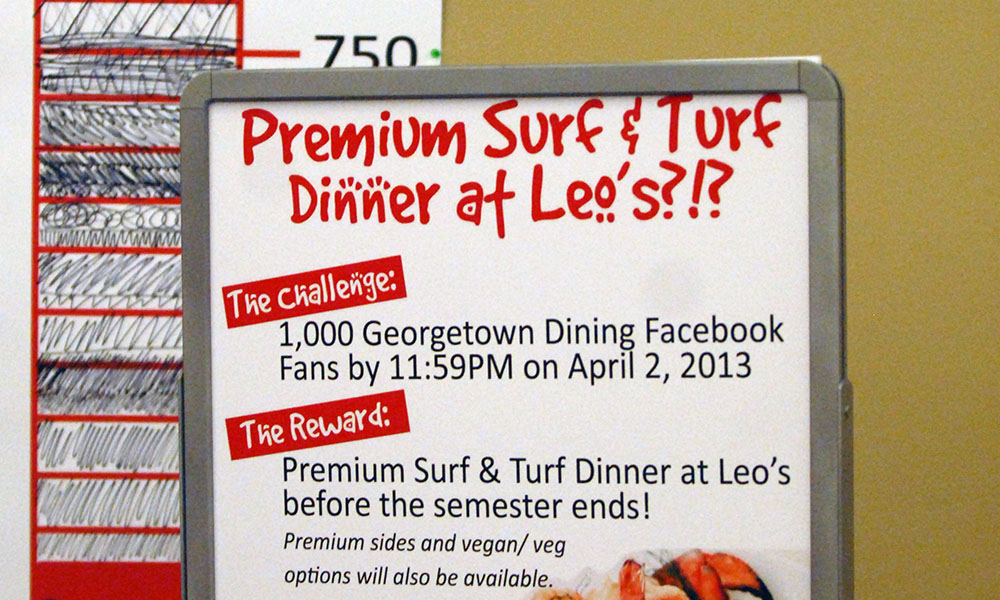On April 2, the Georgetown Dining Facebook page received 1,000 likes as the culmination of a campaign promising a Surf and Turf dinner for students if the set goal of likes were reached. This campaign forms part of the increasing efforts made by the Georgetown Dining management, run by Aramark, to increase student satisfaction with dining services offered on campus.
However, several concerns have arisen in the University community—especially from workers and students—in response to changes made to the food at Leo’s in the past year. Even though students have spaces to voice these concerns through means such as the monthly Dine with Directors meetings, the ability of workers to voice their concerns about different issues is limited by Aramark and District policy.
“We really need workers to have protected speech,” said Erin Riordan (COL ’15), a student involved with workers’ issues on campus. “They can talk about their conditions in the workplace and how they are being treated publicly, and they also have a grievance procedure to deal with that, but in terms of food stuff, if they talk about the food and are retaliated against because of that, they have no legal recourse to protect themselves from that.”
Part of the problem arises from D.C.’s at-will employment policy, which allows employers to terminate a working relationship without previous warning and no subsequent liability.
“If an employee talks about food quality at Leo’s they can have their hours cut, they could be fired. Aramark has no protection for the workers in that sense, so there’s no way in which workers can comment about food safely,” explained Riordan.
While other universities such as American University and Gallaudet offer employees a space in their food committees, workers are not included in the monthly meetings held by the Student Food Committee at Georgetown, where students give the administration feedback on their dining experience.
“If the administration adopts a food committee with students, workers, and management, then students would know [when] managers are telling the truth about certain things, but right now workers don’t really have a voice in what they serve in the cafeteria,” said a Leo’s source who preferred to remain anonymous for fear of retaliation.
“Maybe something [food] is old, and workers are told to put it out and can’t say anything because if they say something they could suffer,” said the source. “If we had a committee we could talk about those issues, like what to do with old food, see if we can donate it to homeless shelters or something like that. It would be a very positive thing.”
According to several current Leo’s workers who preferred to keep their identities anonymous, budget cuts have been affecting both the quality and quantity of food being provided at Leo’s.
“A lot of kids have been dropping their meal plans because the quality of the food hasn’t been getting better,” said one of the sources. “We have a lot of senior workers who have been here for years. They say kids used to come as freshman and graduate students, not only to eat but just to stop by and see how workers were doing, how their health was, how their kids were. They don’t come in as much as they used to and it’s not because of the workers, but the food quality.”
Abigail Cooner (SFS ’16), Vice Chair of GUSA’s Subcommittee on Food Services, argues that the main reason for the negative feedback on the food at Leo’s is not due to an actual decrease in quality, but due to the student culture surrounding dining hall food.
“A large part of the way people feel toward dining depends on the attitude on campus, and right now there’s definitely a culture of having a negative attitude toward the food that we eat at Leo’s,” said Cooner. “Beyond the food being good or bad on a certain day, it’s just a thing to not necessarily love it.”
At the same time, Samuel Greco (SFS ’15), Vice Speaker of the Senate and Chair of the Subcommittee on Food Services, supports the way in which the administration is handling the budget cuts.
“When you have the average cost of food rising at about 7 percent a year, and the meal plans rise about 2 percent a year, you’ve got 5 percent that you have to make up somewhere,” Greco said. “From what I’ve seen, we have managed that difference pretty well. The administrators that we work with at Leo’s are open to listen to our concerns and we’ve seen improvements in the options of food.”
However, budget cuts not only have an effect on the food quality offered to students, but on workers themselves. Allegations have been made against Dining Services trying to cut employees’ working hours to 37.5 hours, a range that hinders workers from receiving the benefits of being employed for 40 hours weekly and thus considered full-time workers.
“If workers were given a protected voice, more could be done to address food and worker issues because they are the ones that care most about the students and about the food,” said Riordan. “They are involved day to day in knowing us as students and being our friends and at the same time in making the food and preparing it.”





